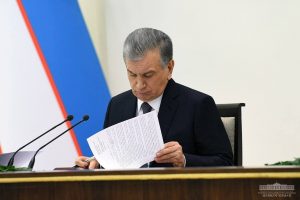Uzbek President Shavkat Mirziyoyev’s first term comes to an end later this year and he’s expected to run for a second, five-year term. Whether there will be any serious challengers allowed to run against him is an increasingly dim prospect, given legal changes criminalizing insulting the president online and harassment of presidential hopefuls.
Mirziyoyev recently signed into law amendments to the country’s criminal code that criminalize “insult and slander” of the president online. The changes merely expand already existing prohibitions on denigrating the president in printed or other mass media, to include telecommunications networks and the internet. But coming a little more than six months before the election, scheduled for October 24, the amendments certainly have a chilling effect.
In an early March statement on the draft of changes for the criminal code, Human Rights Watch noted, “Laws that penalize criticism of public figures are contrary to international law, and the fact that some forms of expression are considered insulting is not sufficient to justify restrictions or penalties.”
In 2020, Uzbekistan’s moves to decriminalize defamation yielded laudatory comments from OSCE Representative on Freedom of the Media, Harlem Désir. Decriminalization would mean moving slander and libel from the realm of the criminal, for which arrest and jail sentences are potential penalties, to the civil realm — a world of fines.
Under the new amendments, a person found guilty of insulting the president on TikTok (or Telegram or Facebook or in a blog post) could face up to five years in prison.
Many countries have laws addressing slander and libel — verbal and written defamatory statements — so why the concern about Uzbekistan’s?
First, a central problem is that Uzbekistan has an expansive understanding of what counts as defamation, “insult” has its own article in the criminal code, too, and Tashkent has not shied from using such statutes to silence critics. In the U.S. understanding, in general, an opinion cannot be libel, nor can stating a true fact be defamation. Insulting the president is legal, protected, speech. A number of European countries do have laws against insulting heads of state and others, though prosecutions are rare and seldom are such laws used to tamp down on criticism of top leaders.
That has not been the case in Uzbekistan. Although not all cases end in trial and conviction (often because of an international outcry at the arrest of the individual involved), the ambient reality remains that anything that can be construed by a very conservative system to be an insult to the president puts a person in jeopardy, thus shrinking the available space for dissent and discussion. When is a criticism just a criticism, and when is it an insult? And when is that insult a crime?
Second, the timing matters. Beyond the fact that Mirziyoyev pledged to decriminalize defamation last year and this year is expanding it where he himself is concerned, Uzbekistan is headed toward a major election in October. And election season is high time for critiques.
While the state dusts off and updates its criminal code, presidential hopefuls not named Mirziyoyev face harassment. Jahongir Otajonov, a well-known Uzbek singer who declared his intention to run for president earlier this year, told RFE/RL he’d been warned of a bounty put out for his assault. In a video recorded in his office in Istanbul, a group of men tell him that $15,000 had been offered to people to beat him up. Another presidential hopeful, Khidirnazar Allakulov, was briefly arrested in what he viewed as a clear intimidation effort.

































